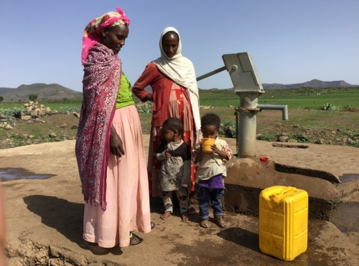
Eritrea can be hot and dry, and has very little groundwater to speak of – and so the communities in this mountainous, beautiful but arid sliver of a country on East Africa’s Red Sea are both keen and quick to embrace any opportunity that creates access to clean water.
All over this region, community water points are broken and with no access to spare parts or resources, communities have to revert to the ancient and desperately unsafe task of fetching water from open and dirty water sources such as small streams or ponds shared with local livestock.
Fikadu Demoz, who lives with her family in Ksad Dalwo Village, Dubarwa was fed up of walking three or more kilometres a day to get water for cooking and for her family to drink and wash themselves. This dirty water had to be boiled before it was safe to drink, which meant Fikadu or her children spent most of their time fetching water and gathering sticks to boil it.
“I was always rushing, rushing. Always getting water and trying to get the food cooked. It took up so much of my time, there was no time for other things. I had to bring my son Abrahim with me to get the water every day. He gets very tired and he wants to stop and play with thee other children often but we did not have time,” says Fikadu. “Sometimes I was so busy I had to send my daughter to get the water and then she would miss some of school.” Fikadu really missed spending time with her sister Genait and catching up on all the local news. She felt isolated and was fed up with always working and never relaxing.
Last year, Vita partnered with the communitiy as they fixed their old water point which is now functional and providing safe, clean water for approximately 1,500 people in the village and surrounding hills. Each of the water points that gets fixed through the Vita programme serves approximately 100 hundred families, and that saves a lot of wood from being burnt to boil water. In fact, each well saves about 1,000 tonnes of carbon emissions each year, and each tonne saved is a called a carbon offset. Vita has partnered with communities like Fikadu’s in Eritrea and many more in Ethiopia to sell the carbon offsets that they generate. This directly supports the communities as they drive their own development as well as facilitating the transition to a more sustainable future.
“Now the water point is just a short walk from my compound and I meet my sister there every day,” says Fikadu. “Our children play and run around and I hear all the funny stories from our village. We laugh a lot when we are together!”
